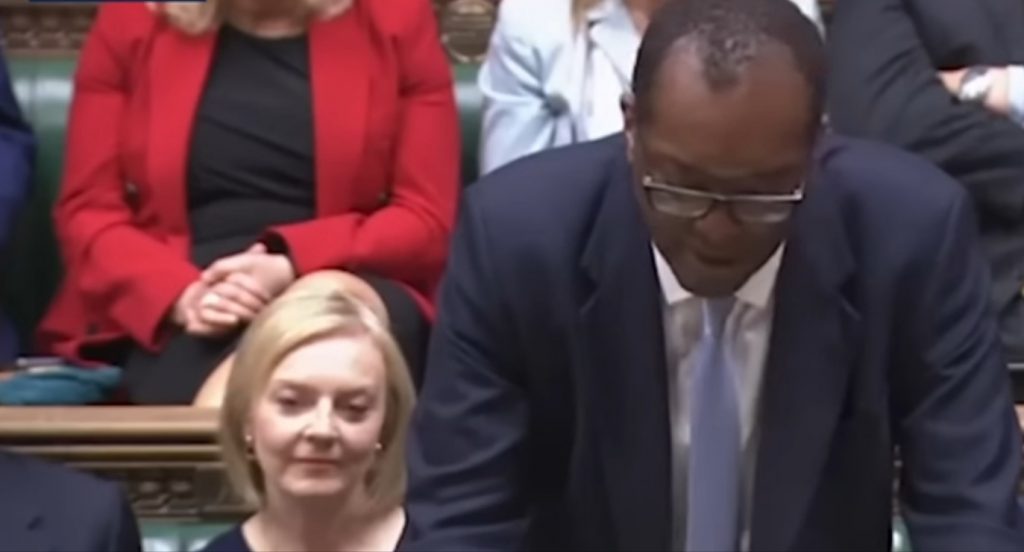Truss: Stabbed In The Back? Or Tripped Over Her Feet?

The collapse of Germany at the end of World War One was so sudden, and occurred without a yard of German soil being occupied by French, American or British troops, that a narrative sprung up: the country had not been defeated in battle, but had been stabbed in the back by a conspiracy of financiers, freemasons and Jews.
Something similar seems to be happening with memories of the Truss-Kwarteng administration. It didn’t fail, it was stabbed in the back for the crime of being too Conservative, too radical, and for – ultimately – believing in Britain rather than in managed decline. Truss, in this version of events, is another Thatcher, only this time the wets (read “Sunak and city buddies”) won.
There are several things strikingly weird about this analysis.
Firstly, it casts Truss and Kwarteng as the ones pursuing a brave path against conventional wisdom, as Thatcher did before. And, indeed, Mrs Thatcher did follow a brave path. Upon entering Number 10 in 1979, she cut spending (removing the Double Lock on pensions), and increased taxes (most notably VAT). Her view was that only by righting the fiscal ship, and reducing the deficit, would Britain be able to afford tax cuts in the future.
Truss, by contrast, proposed the opposite. Despite debt-to-GDP being well above the levels of 1979 (around 90% vs 40%), she wanted to cut taxes and increase spending. Her policies were not Thatcher or Howe-like, they were a return to the earlier 1970s of Wilson. Callaghan and Heath.
Secondly, there was no “conspiracy” in the City. Borrowing rates spiked and the pound fell because investors were spooked that these policies would lead to increased inflation. (Like, you know, happened in the 1970s when they were last tried.) Investors, either in the UK or abroad, are not under any obligation to buy British government debt. If they think inflation (and therefore higher rates) are coming, it is economically rational to want to hold less of it. That’s not a conspiracy, that’s fulfilling their fiduciary duty to their investors.
Thirdly, Truss and Kwarteng got themselves in this mess because they didn’t want to hear from people that disagreed with them. Again, the difference with Thatcher could not be greater. Thatcher had regular stand up rows with people she disagreed with; but until the end (when I admit she went slightly mad) she kept critics around her, because she welcomed the intellectual scrutiny. And this stretched from the Civil Service, where she clashed regularly with Robert Armstrong, to Howe, Lawson, Clarke, and Heseltine in the Cabinet.
Truss and Kwarteng, by contrast, chose not to get OBR figures on the impact of their policies on the debt and deficit, because they knew the numbers would be bad. They fired Tom Scholar, rather than listen to what he had to say about how the markets would react to their budget.
There’s one final piece of the rewriting history that needs to be smacked on the head. This one holds that, actually, Truss and Kwarteng’s only mistake was presentational. Everything in the budget had been trialled, and if they hadn’t been so kind to higher rate taxpayers, then all would have been alright. (It was those damn socialists in the City on minimum wage who were… wait… this makes no sense.)
This simply isn’t true. During the election contest, Ms Truss had repeatedly been cautious on energy subsidies. And when she ascended (briefly) to the top, she announced a £150bn plan to freeze household energy bills, while cutting taxes.
Nowhere could this be more different to Mrs Thatcher, who famously said “you can’t buck the market”. And who, on assuming power, scrapped the entire mechanism of price planning that she inherited from the Callaghan government.
Callaghan misread the markets, (almost) saying “Crisis, What Crisis?”. But at least he got it at the end, telling the Labour Party Conference: “We used to think that you could spend your way out of a recession, and increase employment by cutting taxes and boosting Government spending. I tell you in all candour that that option no longer exists”.
Ms Truss still hasn’t got it.